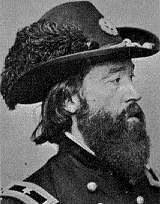Sweeny, Tom
 Fighting Tom Sweeny, a native of County Cork, Ireland, is one of the more colorful products of the U.S. Army.
Fighting Tom Sweeny, a native of County Cork, Ireland, is one of the more colorful products of the U.S. Army.
After emigrating to New York in 1832, Sweeny joined a New York militia regiment which was called into service in the Mexican War. Wounded in the assault on Churubusco, August 20, 1847, he lost his right arm. After recuperating, he was commissioned a Second Lt. in the regular army, and by May, 1861, was a Captain in the 2nd U.S. Infantry.
Called to St. Louis in support of 2nd Infantry troops stationed there under Capt. Nathaniel Lyon, Sweeny commanded the regulars during the CampJackson affair on May 10, 1861, and soon thereafter was commissioned a Brigadier General of Volunteers. He took command of the force sent by Lyon to southwest Missouri, fought at Carthage on July 5, 1861, and fought and was wounded at Wilson’s Creek in August.
After thus serving in the vanguard of the union’s first aggressive acts in the western theater, Sweeny commanded troops at Fort Donelson and Shiloh in ‘62, and was wounded again at Shiloh. His career reached a zenith in May, 1864, when he was given command of a Division in the Army’s XVI Corps during the Atlanta campaign. However, within two months he was cashiered after a fist-fight with another Division commander.
Fighting Tom Sweeny achieved a measure of immortality soon after the Civil War closed. Active in a group known as the “Fenian Brotherhood,” which supported Irish independence from Britain, Sweeny was the principal architect of a Fenian scheme to invade Canada and trade Canadian territory for Irish independence. An invasion actually got underway in June, 1866, but failed to achieve success.
Sweeny died in 1892, and is buried in Greenwood Cemetery in Brooklyn, New York.

